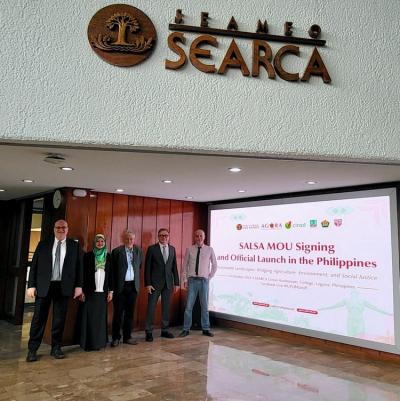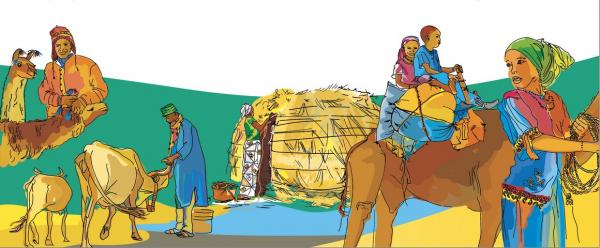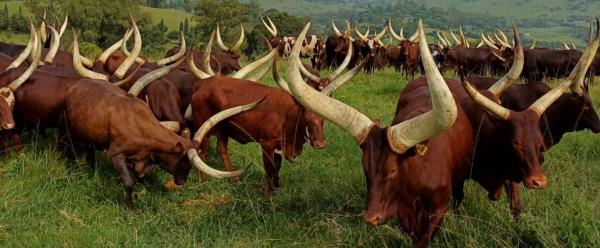Institutional news 2 January 2026
- Home
- CIRAD news
- News
- SALSA, a new platform in partnership
SALSA, a platform in partnership for sustainable agricultural landscapes in Southeast Asia

Launch of the SALSA platform in partnership © UPLB
"This region is one of world's biodiversity hotspots, a set of complex natural landscapes that is under very substantial pressure from human agricultural activities", said Jean-Marc Roda, CIRAD Regional Director for Southeast Asia on Monday 14 October at the launch of a new platform in partnership for research and training, Sustainability of Agricultural Landscapes in Southeast Asia (dP SALSA).
"Sustainability and landscapes are inseparable", Dr Agus Setyarso from Institut Pertanian Stiper (INSTIPER) added from Indonesia. "People are an integral part of these landscapes, and new farming practices are also influencing local lifestyles."
This new platform in partnership will be studying how the emergence of new types of smallholders, who make greater use of digital technologies than previous generations and have different ambitions, is likely to affect the landscape mosaic in three Southeast Asian countries: Malaysia, Indonesia and the Philippines. The aim is to identify the factors for change, opportunities and risks involved in that emergence. This will mean taking account of the interactions between farming, forests and stakeholders and the associated levels of governance.
A launch focusing on regional partnerships
The launch event is a major milestone for multilateral relations between the three partner countries, centring on the shared aim of building more resilient, sustainable farming systems. The SALSA platform associates five partners: the University of the Philippines Los Baños (UPLB), Universiti Putra Malaysia (UPM), Institut Pertanian Stiper (INSTIPER, Indonesia), CIRAD, and the organizer of the signing ceremony, the Southeast Asian Regional Center for Graduate Study and Research in Agriculture (SEARCA), which are all hugely enthusiastic about the shared project.
The event continued with scientific sessions that allowed fruitful discussions laying the foundations for shared solutions to the agricultural and environmental challenges facing the region.
"I am really impressed by the partners' commitment to the platform", said Philippe Guizol, dP coordinator for CIRAD in Montpellier. "Its scientific programme is the fruit of their discussions; CIRAD merely supported them."
An MOU to seal commitments
The signing of a memorandum of understanding (MOU) between the various partners has cemented that collaboration, symbolizing a strong mutual commitment and shared roadmap. "SALSA is a great opportunity to strengthen regional networks and steer our efforts towards greater proximity with our local partners in the coming years", UPLB Vice Chancellor Dr Nathaniel Bantayan added.
Three strategic pillars for a comprehensive project
The SALSA platform rests on three strategic pillars, each targeting specific issues for sustainable farming systems:
- Understanding the emergence of new practices and innovations
This first pillar focuses on analysing agricultural innovations capable of transforming current practices. At the launch, Professor Amado A. Angeles, PhD, Dean of the UPLB College of Agriculture and Food Science, presented the progress made on sustainable tree crop management. Representatives from INSTIPER and TRAC also shared examples of innovations rolled out in Indonesia and the Philippines.
For Amado Angeles, "innovative agricultural technologies are vital for the long-term future of our landscapes". - Territorial governance and agricultural and forest landscapes
The second pillar concerns agricultural and forest landscape governance strategies. Experts from the UPLB-Agricultural Systems Institute have pinpointed integrated natural resource management models, which are vital for reconciling agricultural productivity and ecosystem conservation in varying socioeconomic contexts. - Anticipating threats and boosting the sustainability of production systems
This last pillar centres on adapting farming systems in the light of emerging environmental threats such as climate change and crop diseases. Researchers from the SPIDTECH National Crop Protection Center have suggested innovative ways of making agricultural ecosystems more resilient, with a focus on biotechnology and integrated crop management.
A partnership for the future of farming and forest landscapes in Southeast Asia
By bringing together researchers, policymakers and agricultural development experts, dP SALSA is aiming to build innovative solutions and long-term public policies while fostering knowledge sharing on a regional level. the aim is to make dP SALSA an innovation platform open to smallholders and local communities, while making farming and forest landscapes more resilient to socioeconomic and environmental challenges.
This official launch is just the start. With its regional and international partners, dP SALSA intends to invent and disseminate sustainable solutions for resilient farming and forest landscape mosaics, while protecting ecosystems and local people's food security. The platform is living proof of how international cooperation can tackle current global challenges.





























